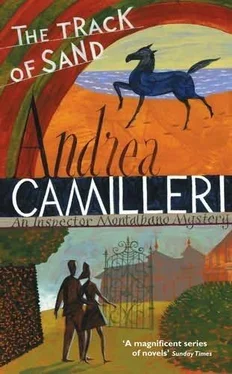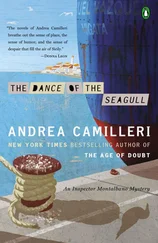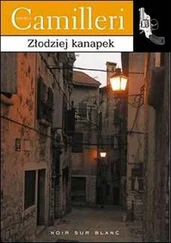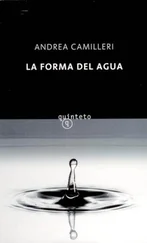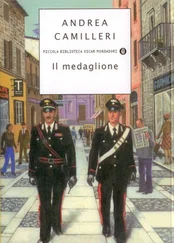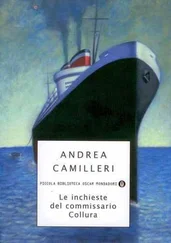“He hasn’t been kidnapped.”
Rachele Esterman leaned back stiffly in her chair, suddenly pale.
“How can you know that? Have you spoken with anyone at the stable?”
“No.”
Looking at her, Montalbano felt as if he could hear the gears whirring in her brain.
“Is he . . . dead?”
“Yes.”
The woman pulled the ashtray towards herself, took the cigarette out of her mouth, and extinguished it with great care.
“Was he run over by—”
“No.”
She must not have understood the meaning of this at once, because she repeated the word “no” several times, under her breath, to herself.
Then she suddenly understood.
“Was he killed?”
“Yes.”
Without saying a word, she got up, went over to the window, opened it, leaned out with her elbows on the sill. Every so often her shoulders heaved. She was silently crying.
The inspector let her get it out of her system, then went and stood next to her at the window. He realized she was still crying, so he pulled a packet of tissues from his jacket pocket and handed it to her.
He then went and filled a glass with water from a bottle he kept atop a file cabinet, and handed this to her. Rachele drank it all.
“Would you like some more?”
“No, thank you.”
They returned to their prior places. Rachele appeared calm again, but Montalbano feared the questions that were sure to come. Such as:
“How was he killed?”
Now, there was a difficult question! But, instead of continuing this question-and-answer session, wasn’t it perhaps better for him to tell her the whole story from the moment he had opened his bedroom window?
“Please listen to me,” he began.
“No,” said Rachele.
“You won’t listen to me?”
“No. I already understand. Do you realize you’re sweating?”
He hadn’t noticed. Perhaps the woman should be enrolled in the police force. She didn’t miss a thing.
“So what? Is that supposed to mean something?”
“It means they must have killed him in some horrible way. And it’s hard for you to tell me. Am I right?”
“Yes.”
“Could I see him?”
“That’s not possible.”
“Why not?”
“Because after they killed him, they took him away.”
“For what purpose?”
Indeed, for what purpose?
“Well, we guessed that they removed the carcass”—the word must have stung her, because she briefly closed her eyes—“to prevent us from seeing his brand.”
“He wasn’t branded.”
“Which would have let us track down his owner. But that has proved to be an erroneous surmise, since you, in the end, have come to report his disappearance.”
“But if they figured I would come and report it, what need was there to take him away? I doubt they’re planning to put him in my bed.”
Montalbano felt at sea.What was this about her bed?
“Could you explain what you mean by that?”
“Haven’t you ever seen The Godfather , where they put the horse’s head in the movie producer’s—”
“Ah, yes.”
And why, in that film, had they put the horse’s head in the producer’s bed? Then he remembered.
“But have you, by any chance, been made an offer you can’t refuse?”
She gave a strained smile.
“Oh, I’ve had a lot of those. And to some I’ve said yes, to others I’ve said no. But there’s never been any need to slaughter a horse.”
“Have you been in these parts before?”
“The last time was two years ago, for the same reason. I live in Rome.”
“Are you married?”
“Yes and no.”
“Your relationship with—”
“My relationship with my husband is excellent. Fraternal, I’d say. And, anyway, I think Gianfranco would sooner commit suicide than kill a horse.”
“Do you have any idea why anyone would want to do such a thing to you?”
“The only one I can think of would be to eliminate me from tomorrow’s race, which I would surely have won. But that would seem a bit excessive.”
She stood up. Montalbano did likewise.
“Thank you for your courtesy,” she said.
“Aren’t you going to file a report?”
“Now that he’s dead, it doesn’t matter anymore.”
“Are you going back to Rome?”
“No. I’ll be going to Fiacca anyway, day after tomorrow. And I’ve decided to stay a few more days after that. I would like it if you could keep me informed, especially if you find anything out.”
“I’m hoping to do just that.Where can I reach you?”
“Let me give you my cell phone number.”
The inspector jotted it down on a sheet of paper that he put in his jacket pocket.
“In any case,” the woman continued, “you can always call me at the home of my friend who’s putting me up.”
“What’s the phone number?”
“I think you already know her phone number. She’s Ingrid Sjostrom.”
“And so, just like that, Rachele Esterman has sent all our wonderful hypotheses down the tubes,” Montalbano concluded, finishing his account of their meeting.
“While leaving all our problems the same as they were before,” said Augello.
“First of all, why did they kidnap and kill the horse of an outsider?” Fazio asked.
“Well,” the inspector cut in, “it’s possible they have no gripe with her, but with Saverio Lo Duca.”
“But then they would have grabbed and killed one of his horses,” Mimì objected.
“Maybe they didn’t know that the horse didn’t belong to Lo Duca. Or else maybe they knew perfectly well and killed it precisely because it didn’t belong to Lo Duca.”
“I don’t follow,” said Augello.
“Say there are people who want to do harm to Lo Duca. To ruin his image. If they kill one of his horses, the news probably won’t make it out of the province. But if they kill the horse of a woman from his social circle, a horse in his care, then, when that lady goes back to Rome, she will tell everyone what happened, which will put a blot on his reputation. We all know that Lo Duca brags high and low that he is untouchable and has the respect of everyone, including the Mafia. Does that make sense to you?”
“It makes sense,” said Mimì.
“Your argument sounds reasonable enough,” Fazio admitted. “But it seems a bit too roundabout to me.”
“Could be,” Montalbano admitted. “And, second of all, why did they come back for the carcass, taking a very grave risk?”
“Every idea we’ve had so far has turned out to be totally wrong. And, to be honest, at the moment I can’t come up with any other hypotheses,” said Mimì.
“How about you, Fazio? Any ideas?”
“Nah,” said Fazio, dejected.
“Well, then, we’ll stop right here,” said Montalbano.“As soon as somebody has another brilliant idea—”
“Wait a second,” Mimì butted in. “Signora Esterman had second thoughts about reporting the crime and decided it was pointless. So, what I’d like to know is: What do we base our next move on?”
“We base our next move on one thing, Mimì, which I’ll tell you promptly. But first I must ask you a question. Do you agree that this sort of thing can have grave consequences?”
“Well, yes.”
“So, our next move will be based, unofficially, of course, on the desire to prevent, however we can, any possible reaction. By whom? We don’t know. How? We don’t know. Where? We don’t know.When? We don’t know. If you want to take yourself out of the game because there are too many unknowns, you have only to tell me.”
“Actually, I think unknowns are fun.”
“Then I’m glad to have you on board, Mimì. Fazio, do you know where Lo Duca keeps his horses?”
Читать дальше
